By Dac Collins. April 4, 2019. Apparently having a baby on your hip while speaking at a public hearing increases the likelihood that people will actually listen to you. Undeniably charming and helpless, babies have the unique (and coveted) ability to evoke sympathy. If they could only talk into a microphone, they’d have the room in an instant.
So it comes as no surprise that during the weeklong series of hearings that were held across the state of Oregon to gauge public support of House Bill 2020 — also known as the Cap and Trade Bill or the Clean Energy Jobs Bill — the babe-on-the-hip strategy was employed on more than one occasion.
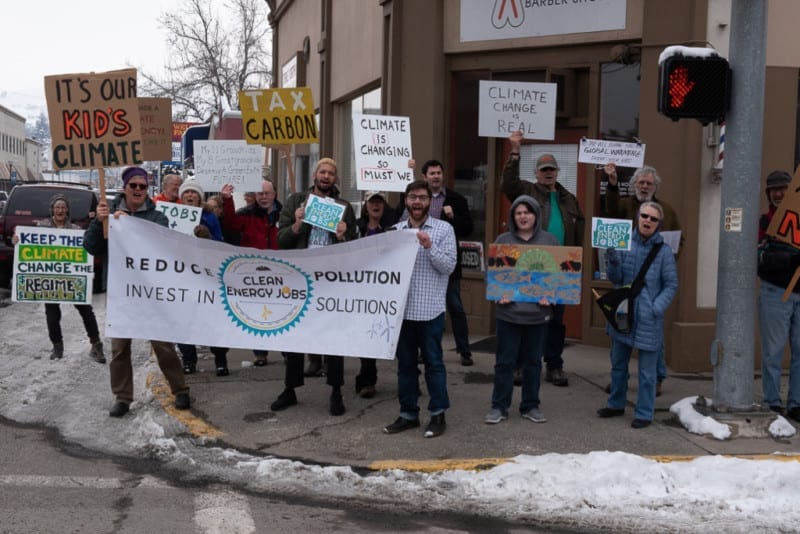
A group of HB2020 supporters rally in front of the Dalles Civic Auditorium on May 1. Photo by Jurgen Hess.
One of the more contentious pieces of legislation coming out of Salem this year, HB2020 aims to drastically reduce the state’s overall carbon emissions by setting a cap on those emissions by 2021. That’s the “cap” piece.
The state would then sell allowances to the largest polluters (those emitting more than 25,000 tons of greenhouse gases each year) for each ton of pollution they emit. If they end up with more allowances than they need, companies could then trade those allowances amongst themselves. That’s the “trade” piece.
The money generated by this carbon marketplace would then be funneled into renewable energy and climate adaptation projects, theoretically funding Oregon’s transition to a cleaner and greener economy. Which is why some proponents of the legislation are referring to it as a “cap and invest” bill.
Detractors claim that HB2020 would drive up the prices of fossil fuels and electricity, and would consequently increase the overall cost of living for working class families. They say that even if Oregon is able to bring its carbon emissions down to practically zero, that would still only account for approximately one percent of the country’s overall carbon emissions. And making the age-old “drop in a bucket of water” argument, they point to China, whose carbon emissions are almost double those of the United States…and rising.
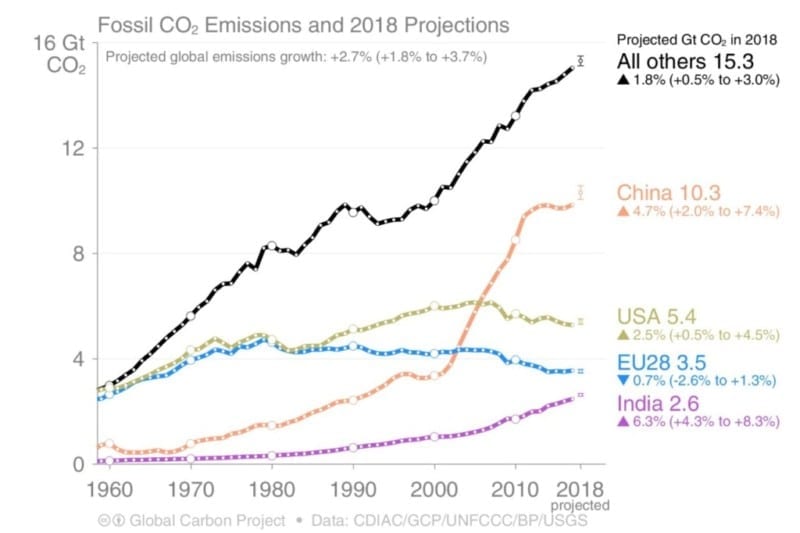
This chart shows the rise in global carbon emissions from 1959 to 2017, and projects a growth in global carbon emissions of approximately 2.7 percent. Courtesy of the Global Carbon Project.
Because of this polarization amongst Oregonians, the last iteration of the Clean Energy Jobs Bill failed during the 2018 legislative session. This year, however, with the full support of Governor Kate Brown and other top democrats in Salem, it seems likely that Oregon will become the second state in the nation (behind California) to put a price on carbon.
Under the leadership of House Speaker Tina Kotek (D-Portland) and Senate President Peter Courtney (D-Salem), the Joint Committee on Carbon Reduction announced in February that it would hold a series of five public hearings across the state, allowing citizens to comment on the proposed legislation. Two of those hearings were in Newport and Medford. The other three were held within the Columbia River Basin.
Springfield
The first stop on the Cap and Trade tour was in Springfield on Feb. 22. According to the Register-Guard, roughly 100 people showed up to speak at the City Hall, many of whom spoke in favor of the bill.
69-year old Karen Fielder said she was there to represent her grandsons, who would benefit from a transition to cleaner sources of energy.
“Clearly, the status quo is not working,” Fielder said.
Opponents to HB2020 included Marie Bowers, whose family grows ryegrass in the Willamette Valley.
Her 3-month-old baby boy in tow, Bowers said the legislation would disproportionately burden family farms, making it all but impossible for her son to carry on the tradition. She said that farmers are already doing everything in their power to conserve fuel and operate efficiently, and that “this bill doesn’t recognize the efforts we’ve made.”
These same concerns would be repeated time and time again as the Committee traveled to the east end of the state in Baker City, then on through the Dalles and down to Bend.
Baker City
The Argus Observer reported that over 200 people showed up to the Feb. 25 hearing in Baker City, and that the vast majority of those who testified opposed the Cap and Trade Bill.
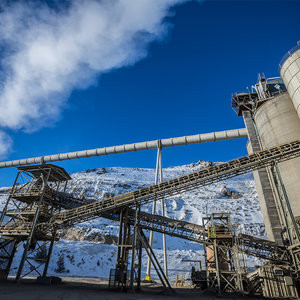
The Ash Grove Cement Plant is located approximately 27 miles southeast of Baker City. Photo courtesy of Ash Grove Cement.
“Cap and trade will devastate Ontario,” said Ontario Mayor Riley Hill. He explained that some of the businesses there would simply move to Idaho to avoid the onerous regulations imposed by HB2020.
With 115 employees, Ash Grove Cement in nearby Durkee is the biggest employer (and the single biggest source of air pollution) in the county. An overwhelming number of Ash Grove’s representatives and employees showed up in Baker City to testify, and many of them echoed Mayor Hill’s concerns that they were better off moving the operation next door to Idaho. Some referred to State Rep. Findley’s (R-Vale) previous claims that “if the manufacturing capacity at the Durkee, Oregon Plant is lost to Chinese competition because of the proposed carbon law, global emissions of carbon will increase by more than 417,000 tons per year.”
Bend
The testimonies that were heard in Bend on March 2 were more evenly balanced according to Bend’s Channel 21 News.
“It’s not just gas for your car,” Jefferson County resident Sue Rahi said. “It’ll be our heating costs, it’ll be our food costs. Somebody even testified it would increase the cost of our garbage collection. It’ll increase the cost of living, period.”
Other testimonies urged their fellow Oregonians to look at the bigger picture, and implied that living in a changing world means that we all have to make sacrifices.
“You can be concerned about your own personal gains and losses or you can be concerned about the big picture. And I think it’s really important that we all work together to find big picture solutions,” said Shannon Sbarra of Volcano Veggies in Bend.
The Dalles
An equally divided crowd of approximately 150 people showed up to the Dalles Civic Auditorium the day before (March 1). A show of hands at the beginning of the hearing revealed the room to be more or less split down the middle.
Mosier Mayor Arlene Burns was one of the first to testify, and she referred to climate change as “the crisis of our time.” She said that while HB2020 might not be a perfect bill, it would represent the start of a worthy effort to address this crisis.
Hood River resident Mark Johnson, on the other hand, argued that the bill was far from perfect. Referring to one of the goals proposed in section 7 of the bill, which aims for a 45% reduction in carbon emissions by 2035, Johnson asked: “Are these goals even achievable? And if they are, at what cost?”
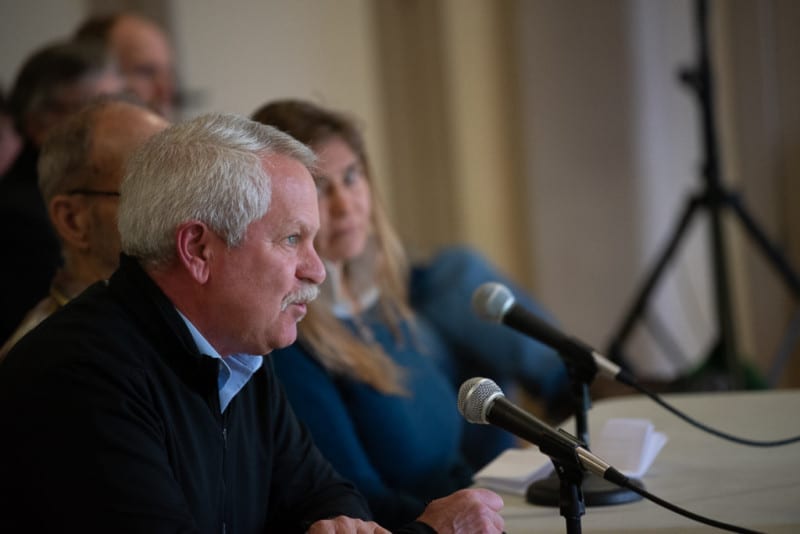
During the public hearing in the Dalles, Mayor Burns (right) looks on as Mark Johnson testifies in opposition to the proposed legislation. Photo by Jurgen Hess.
Herb Stall, a farmer from Hermiston, spoke directly to those costs, saying the projected 16 cent increase in fuel prices would effectively “kill small family farmers.”
Other farmers made similar arguments, restating that rural Oregonians would bear the brunt of increased energy prices.
And Mike Oates, Hood River orchardist and Chair of the Hood River County Board of Commissioners, said that since orchardists are in the business of growing trees, which pull carbon dioxide from the atmosphere, they should receive some sort of exemption from the state.
Conversely, Parkdale fruit grower Paulette Whitwir spoke to the long-term costs of climate change, explaining that “in the long run, it will cost us all more if we don’t pass carbon legislation.” She spoke of the damaging effects that climate change has already wrought on the industry, from shrinking snowpack driving up the cost of irrigation water to seasonal irregularities resulting in shorter blueberry harvests.
Thomas Morning Owl, representing the Confederated Tribes of the Umatilla Indian Reservation, and Donald Sampson, Chief of the Walla Walla Tribe, both traveled from Pendleton to attend the hearing. Striking a more emotional chord with his testimony, Morning Owl said that “when you’re mother is being attacked, you must help her.”
“Earth is crying,” he said solemnly. “Let us hear her.”
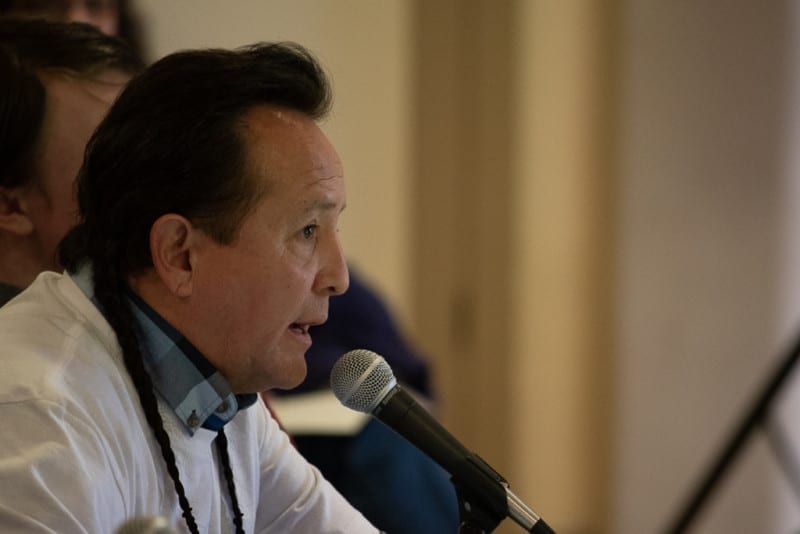
Tribal Chief Donald Sampson speaks in favor of HB2020. Photo by Jurgen Hess.
And Sampson explained how a greener economy would benefit tribes across the state, as many of them are already working to restore salmon runs and improve the overall health of ecosystems.
Then there was Sarah Carlberg, a Forest Grove resident who brought her baby along. Her testimony focused on the growing intensity of wildfires that some climate scientists say are symptomatic of a changing climate.
Carlberg brought up the Camp Fire that devastated California last November and said that since then, her children have been asking her when their house is gong to burn down.
“I respect the opposition,” she said, “but I perceive a threat to my family and my home.”
Reminding legislators that “what we take today we borrow against the future,” Carlberg’s testimony triggered a round of applause from the audience. And while a number of people weren’t clapping, everyone in the room seemed to be listening.


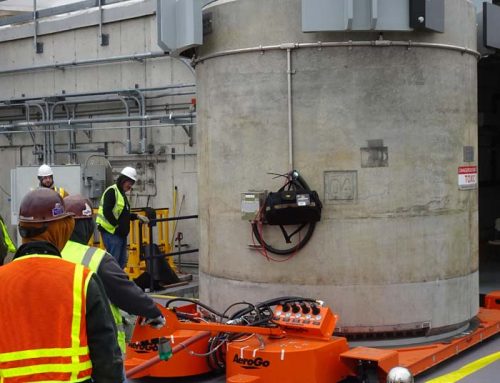
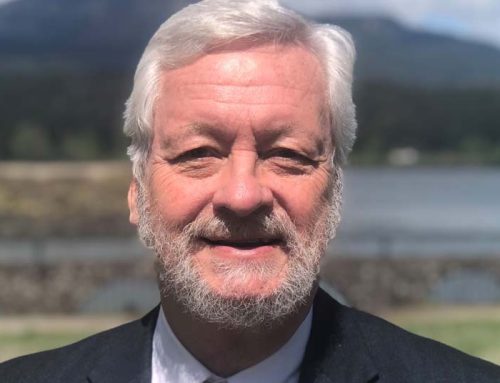
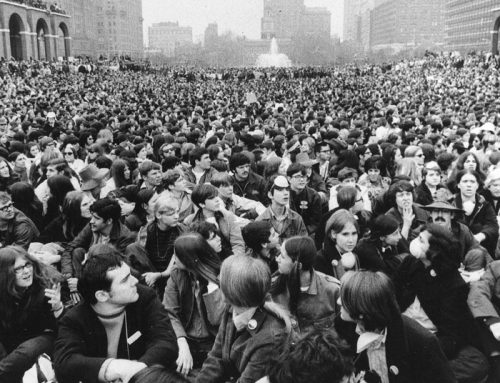
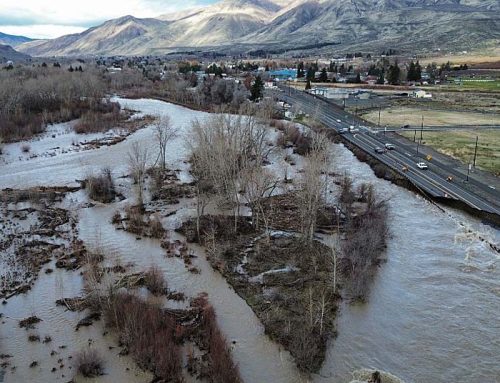
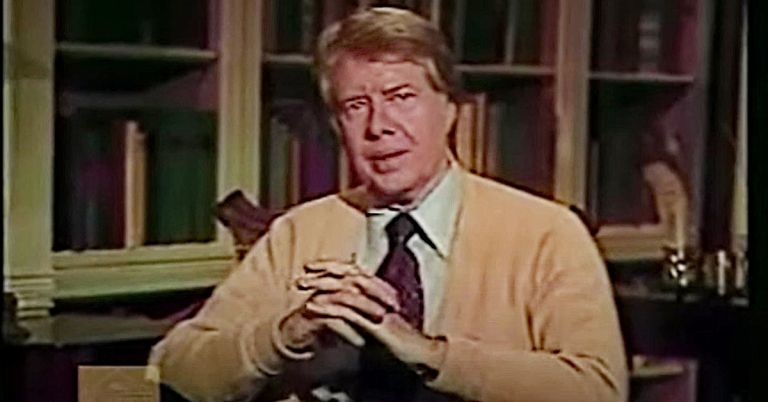





Thank you for covering this important topic! I attended and testified at the hearing in The Dalles, which seemed to me a useful mix of pro and con, rural and urban opinions.
I was encouraged to hear only one climate denier, indicating that nearly everyone is deeply concerned but the controversy is over what to do about it.
I’ve been very disappointed that the environmental NGOs allied to pass this bill have wasted the past decade on trying to put a price carbon, which has no evidence of affecting emissions (e.g., the BC carbon tax has been a clear failure). The best policies are simple mandates, such as Portland’s ban on major new fossil fuel infrastructure. Next best is applying a real social cost of pollution (could include both climate and toxic pollution, ~$400/ton, not $16/ton) for the lifetime emissions of new infrastructure. Such policies needn’t punish individuals or businesses who buy the most efficient products available. That’s roughly what Norway does, and half of their new vehicle sales are EVs.
Thanks, Eric. I think you bring up a great point about incentivizing EVs in Norway. It proves that the carrot oftentimes works better than the stick, and reminds us that there is a lot we can learn from the Scandinavians in terms of sustainability and social progress.